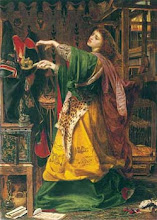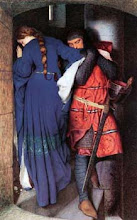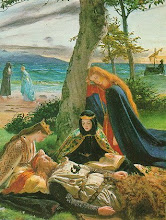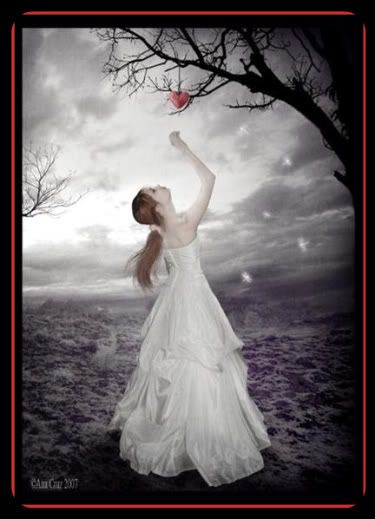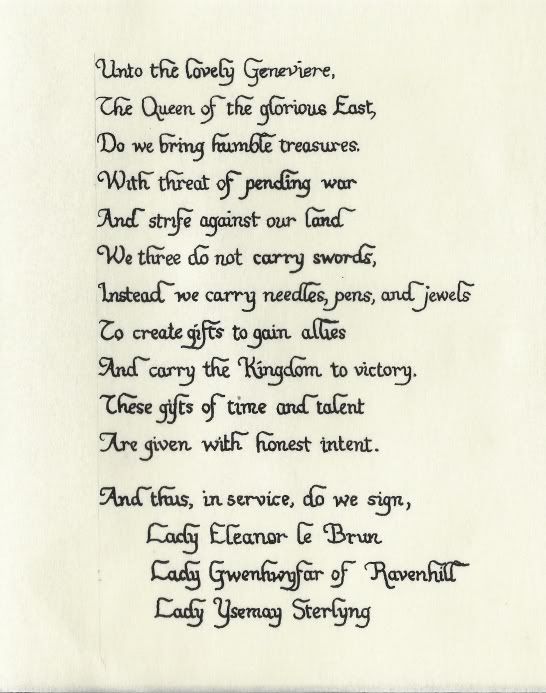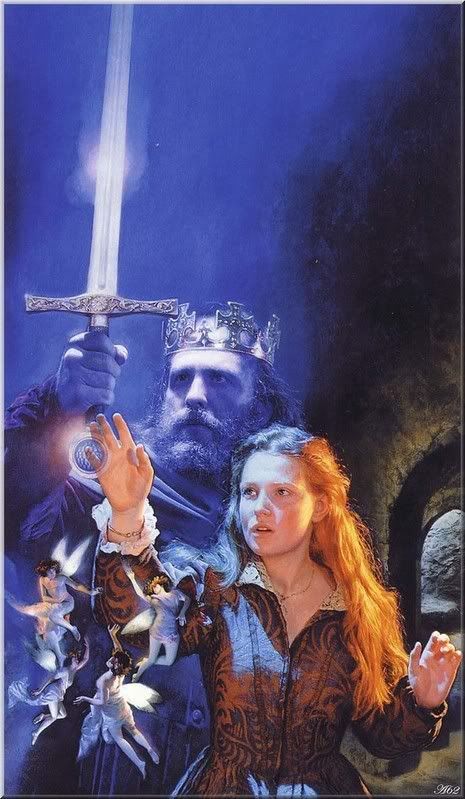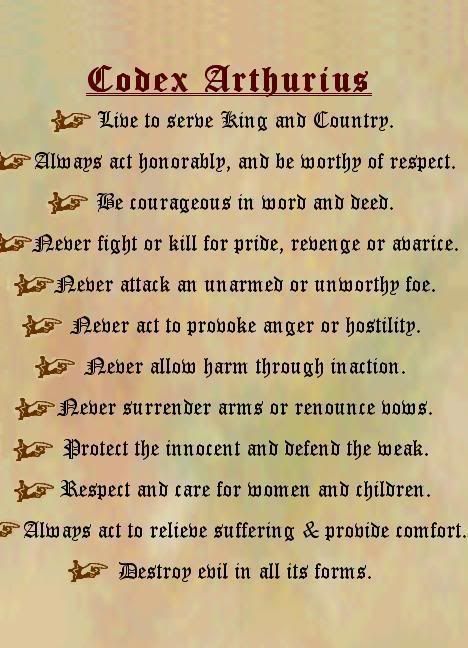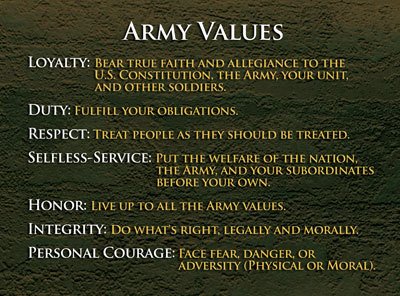
Wednesday, 6 February 2008
"Merlin: Priest of Nature" by Jean Markale

Posted by Leithe Tywysoges at 11:26 1 comments
Sunday, 3 February 2008
Mythical and Literary permanences in King Arthur
Posted by Leithe Tywysoges at 14:27 0 comments

SESSÃO DE COMUNICAÇÕES "REVERBERAÇÕES MÍTICAS"
Título: A perspectiva desmitificadora: da lenda ao mito do Rei Arthur
Autor: Edileide Brito
Vínculo: Professora de literaturas britânica e norte-americana na Faculdade Uniesp-Birigui; Programa de Pós-Graduação em Letras – UNESP-São José do Rio Preto
E-mail: lady_britain@yahoo.co.uk
Resumo: Buscar uma identidade fiel para o Rei Arthur, é atestar para algo complicado, porém fascinante, que nos remete a adentrar em um universo complexo. Contudo, provar tal façanha, seria provavelmente impossível, mas deixemos que a nossa imaginação transforme este rei, ou líder, naquilo que desejamos ser, um homem ideal próximo da perfeição. O fascínio por este rei medieval ou líder guerreiro, tem despertado a curiosidade de pesquisadores, historiadores, literários e leitores, durante todos estes séculos que se passaram, fazendo com que a imagem deste suposto Rei se eternizasse, sendo assim, cumprindo a profecia que Sir Thomas Malory escreveu, ao afirmar em sua obra "Le Morte D'Arthur", "Rei Arthur foi rei e sempre será rei". É irrelevante implicar a existência de um Arthur histórico, mas, provavelmente ele possa ter vivido entre os séculos V e VI d.C., destacando-se como um grande líder guerreiro celta, no qual defendia os bretões, contra as invasões dos saxões. Quanto aos romances de cavalaria, descenderam diretamente das canções de gesta, originárias dos povos germânicos, que rapidamente se propagaram por toda a Europa. Em se tratando das novelas de cavalaria, constituem-se de longas narrativas em prosa, cuja temática era reverenciar os feitos heróicos e ostentar as virtudes de um personagem principal, na maioria das vezes, um guerreiro que se destacava dos demais, através da coragem, da habilidade em manusear as armas, da honra e da justiça. Aparentemente, tais romances assemelham-se aos antigos poemas épicos da Antiguidade Clássica, porém, diferem por um caráter individualista, contrapondo-se ao coletivo das epopéias gregas e romanas. Enquanto os clássicos identificavam o herói como um ícone da comunidade em que estava inserido, representando os ideais e crenças de um povo, os autores nas canções de gesta atribuíam aos heróis alguma fraqueza, discordâncias que abrangessem determinadas circunstâncias sociais, tais características antecederam o futuro arquétipo do herói romântico, um personagem que busca valores autênticos em uma sociedade degradada. Assim, a despeito dessas discrepâncias, o mote das narrativas compreende sempre as batalhas, aventuras fantásticas, dragões, e outras criaturas sobrenaturais.
Palavras-chave: Rei Arthur , lenda , mito , literatura
Abstract: The search for a real King Arthur and subsequent identification has approached something very complicated, sending us to a, fascinating, and complex universe. Neverthless, proving the hypotheses either way is some sort of achievement, that would probably be considered impossible. However, let us through our imagination, consider the changes to this Arthur into an ideal man, perfect in accord with our wishes and hopes (or maybe dreams and fantasies). Therefore, this medieval King or battle leader, has fascinated, our curiosity and raised some complex and serious questions for researchers, historians, literary scholars and readers, since earliest centuries, and has become the everlasting image of King Arthur, and inkeeping Sir Thomas Malory's prophecy that asserted and is documented that: "King Arthur was a king and he will be a king".However, some implications about a historic Arthur are irrelevant, but, it is probable, that he could had lived between fifth and sixth centuries A.D.; this could place him as a great celtic battle leader, who defended the Ancient Britons, agaisnt Saxon invaders.The chivalrous knight novels had their beginning, through the Medieval Gestae Songs originateded from the Vikings and Germanic tribal people, that swiftly spread all over the continent of Europe. Medieval knight novels, are those composed of long texts of prose, and whichever theme appreciates and shows off brave virtuous heroes; where the main character, such as a great warrior or king brings out the qualities required; courage, honor, justice and the skill to use every sort of weapon. Apparently, those novels, seem to align with the oldest epic poems of the Classic Age, but maybe they are different, because of the focus on a single character, rather than against the collective greek and roman epics.Whilst classic authors identified a hero as a community icon, representing all ideals and beliefs of collectivity, some authors in famous medieval gestae songs, ascribed for their heroes, a kind of weakeness; arguments that take turns on social circunstances, some features, preceding an archetypal future for the romantic hero, a character who searches for a kind of authenticy value in a degraded society. And despite of some circunstances, the theme in texts of medieval knights are always battles, fantastic adventures, dragons, and other sort of supernatural creatures.
Key-words: King Arthur , legend , myth , literature
Posted by Leithe Tywysoges at 13:56 0 comments
Unveiling the signs

Abstract
The historical concept that is given in the novel, For whom the Bell Tolls (1940) is that of a tendentious inspiration based in the classic-old essence that the characters compose a saga that is vivified for a historical tradition of the past. This sets itself in the warlike scenery that composes the Spanish Civil War (1936-1939) and lead up to the World War II (1939-1945), which has been perpetuated in our minds eye through constant exposure during our lives from the media rather than the literary angle. Whereas the author has in respect of the self assurance that understanding all the past life, as much of objective form, as in the individual's memory, and individual-description development, or rather, from a distinguished history, a pre-acquired transformation, whose periods of training are presented in detail. However, they do not remain hidden ahead of our eyes, but they have been seen in a much more accurate definition of what the 'old poetry' was able to represent, in the temporal being, and in the history of the previous life of the man. Thus, when referring to, the "bells" "being heard", it does not require the focus of an ideal reader, however, much more, a receiver capable of absorbing the limits of the "looking" in order to discern what the "bells" in the speech are trying to convey and emphasize. Therefore the "bells" cannot be considered the same thing for all, because they are carved out in words for each individual reader/receiver's interpretation of discovering their own understanding and meaning of "for whom the bell tolls".
Key-words: naive ; bells ; allegory ; war ; unveiling ; dessacralization
Posted by Leithe Tywysoges at 13:51 0 comments
The Myth of Arthur

Le Morte D’Arthur, Sir Thomas Malory
Myth and Literature
The myth and literature are interrelationed to share themselves a sort of structure of narrative, that widening the own narrative, the characteres, images and thematics.That relation is only in similarity and it isn’t the same in identity. However, the demistify of myth about the King Arthur’s idealize identity shall be accepted in plan of speech, whilst a mythical and legendery subject and nor consequently, like a metamorphosead “entity” in empiric plan, which seeks for a national identity.The formal treatment implies a less development myth occurrence, explict and supported for literacy purposes.The actions are more arbitrary, motivated in a plain way and more enigmatics inside a continous axis, making a substract of ruptures that mould them, along the time and age.That contrast should be watched and compared to exist in bible texts and in the development in gender of tale.Within the roots of myth, the oldest way in oral literature, they could be lost in pre-history, this way, any asks and answers are speculative. (Vickery, 1982, p.67)
Arthur’ s myth
However, the demistify of myth about the King Arthur’s idealize identity shall be accepted in plan of speech, whilst a mythical and legendery subject and nor consequently, like a metamorphosead “entity” in empiric plan, which seeks for a national identity.So, to considerer a real existence to King Arthur it shall be complicated, because Arthur wasn’t just a king and he just was called king during twelfth century A.D. by Geoffrey of Monmouth in his fabulous story about Historia Regum Britanniae [History of British Kings], like that, old registers in a reference to King Arthur, have identified him just for a first name and have never revealed yet a surname;In century tenth we have the transfiguration about comandant and warlike Arthur as King of England in the Welsh epic Four branches of the Mabnogion.In the Welsh tale Kilhwch and Olwen, has established a sort of transistion in the position of Arthur, mentioning it as King:
In the The dream of Rhonabwy Arthur is called as Emperor:
Has seen that in previous writtings about Arthur, where he was not mentioned as a king, but he has pointed as a powerful warlike celtic leader.The myth is one speaks:... but no any speaks... however, are necessary special conditions for that language transoforms itself into myth;... the myth is a communication system, a message. Here it is why it could not be object, a concept or an idea: it is a significative way, a form… since the myth is one speaks, everything can constitute a myth, since that he is susceptible to be judged by a speech. The myth is not defined for the object of its message, but for the way as it pronounces it: the myth has formal limits, however not substantial. (Barthes,p. 199, 2006)
Posted by Leithe Tywysoges at 00:41 0 comments
Lady of Avalon
The Mabonogi (the name means alternately "a story for children" or "a bard's tale" depending on whose translation you prefer) are comprised of 4 branches, entitled "Pwyll", "Branwen", Manawydan", and "Math". Aside from these four branches there are another 8 individual tales in the British and French style. Taken together, these tales of heroes and stirring deeds depict a Celtic vision of enchantment and romance that moves effortlessly between the physical landscape of Wales and the Celtic underworld.
In some of the later stories King Arthur appears, though certainly not in the guise of the chivalrous knight known to modern readers. He is a giant, whose deeds involve ridding Wales of witches, monsters and other giants with aid of - no, not twelve knights, but his own band of hags, witches, and monsters.
To give you a flavour of the Mabinogion, I've included short summaries of several popular tales
The hero Eilhwch decides that he will find and wed this beautiful maiden, despite the warning that no one ever returned from such a quest alive. In order to win his love, Eilhwch is set a series of heroic (read impossible) tasks by Olwen's father. [Note the similarity to the Hercules myth - that hero was also set twelve seemingly impossible tasks to perform, which he proceeded to do.
Pwyll, Prince of Dyfed, took a fancy one day to sit on a mound at Narberth (North Pembrokeshire) which was said to presage strange adventures. Sure enough, he soon saw a lady dressed all in gold approaching upon a white horse. He sent his servants to fetch her, but no matter how fast they rode, she somehow managed to keep the same distance ahead of them.
Pwyll decided to pursue her himself, but again, no matter how fast he rode, he was unable to catch up to her. Finally, he called out to her, telling her that he loved her. Instantly she stopped, declaring with some humour that "it were better for the horse" that he called out sooner. The Lady Rhiannon said that her family was forcing her to marry someone against her wishes, but now she would have Pwyll or no-one. Sure enough, after many more adventures they were wed.
Bran, the King of Britain had a sister named Branwen, said to be the fairest lady in the world. Bran desired an alliance between Britain and Ireland, so he arranged a marriage between Branwen and the King of that country. The wedding, held at Aberffraw (in Anglesey), turned into a disaster when Branwen's brother insulted the Irish.
The Irish held their peace, but when they had treturned to Ireland, took revenge upon Branwen. The new bride managed to send a plea for help to her brother with the aid of a starling. The British took arms and invaded Ireland, and in the battle that followed almost all the warriors on both sides were killed. Branwen lamented in her grief, "Two islands have been destroyed because of me", and with that she died.
A note: Bran's castle is reputed to be at Harlech (not the much later Harlech Castle), or at Dinas Bran Castle, near Llangollen.
Manawyddan was a prince of North Pembroksehire whose lands fell under a mysterious enchantment which rendered the lands desolate. The prince discovered that a band of mice were eating his wheat, so he lay in wait for them one night. He managed to catch only one of the mice, which he decided to hang as a thief.
Before he could carry out the sentence upon the mouse, strangers began to come to house, offering to buy the mouse from him. Finally a man in the guise of a bishop asked him to name his own price for the mouse. Manawyddan, no fool, declared that the only price he would accept was the end of the spell upon his land. The "bishop" agreed, and revealed that he was, in fact, a rival prince named Llwyd.
Llwyd confessed that he had cast the spell when one of his friends was insulted by friends of Manawyddan. The mice who had been eating the crops were lords and ladies of Llwyd's court, and the mouse that Manawyddan had caught was none other than Llwyd's own wife.
Gwydion and Llew
Gwydion the hero had a son named Llew. Llew was married to the beautiful Blodeuwedd, who had been magically made for him from meadow sweet, broom blossoms, and oak. Blodeuwedd was unfaithful to Llew, and plotted to slay him with the aid of her lover, Gronw. Ah, but it is not easy to slay one who is the son of a god!
Llew could only be killed by a special spear if he was standing with one foot in a cauldron and the other foot upon a slain stag. Blodeuwedd tricked Llew into showing her the position, whereupon Gronw cast the spear. Llew turned into an eagle and flew far away. After a long search Gwydion found his son in Nantle (Caernarfonshire) and restored him to his human form with a magic wand. Gwydion then punished Blodeuwedd for her betrayal by changing her into an owl.
Maxen Wledig, Emperor of Rome
Maxen Wledig had a dream in which he beheld a beautiful maiden who sat upon a golden throne. When he awoke he sent his servants out far and wide, and eventually they found the maiden in Britain. The emperor hurried off to Caernarfon to woo and win the maiden for his wife. While he was absent from Rome his enemies siezed the throne. Maxen Wledig was able to regain power and defeat his foes with the help of his new wife and her friends.
Posted by Leithe Tywysoges at 00:36 0 comments
Literature and Myth
What the priests do not know with their one God and single Truth is, that true history does not, in actuality, exist. The truth has many faces and resembles the old road that leads to Avalon, admittance to which depends both on our proper will and our thoughts ...
Marion Zimmer Bradley
The present article attempts to elucidate theoretical traces of the problematic interrelation between Myth and Literature,and consequently, to direct a new perspective in order to search, analyze and to question for the character of "identity", in the romanesque speech, of King Arthur, the myth .
Ascribe to an understanding between Myth and Literature is to certify for a closed and complex relation, in which it is possible to singularize four aspects that search for define this interrelation, as: the Myth and Literature interrelate to share a narrative structure, in which it encloses the proper narrative, the characters, the images and thematics and; the relation becomes single in similarity and nor in identity; literature can be molded by a history and culture, and consequently, the affinity between mythical and the literary come to develop many aspects of the fiction especially the popular. However, the roots of the myth are the oldest forms of verbal literature, can be lost in pre-history, attributing speculative answers and the interconnection between Myth and Literature presumes a specific history. (Vickery, 1982, p.67)
The relation between Myth and Literature that arises this empiric vision, it is less a single of causes and effects or a generic evolution, whichever distinguish of social functions. Myth and Literature differ where is sacred and in another original sense secular and prophane. The mythical function searches to encourage trully deities, such as, the language of myth expands the context of original logic, problematicize the metaphysical, establishing social or moral thematics. In another hand, the literature use mythological materials as direct source of events and characters which trascribe this relation, moulding the myth to estimulate a original conception.
Posted by Leithe Tywysoges at 00:33 0 comments












